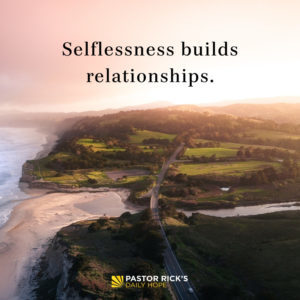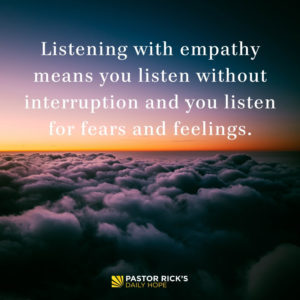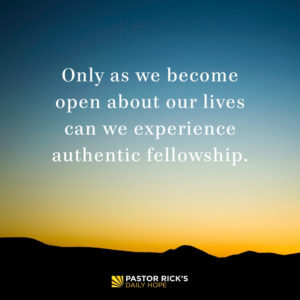Rick Warren's Blog, page 451
April 26, 2019
Las Relaciones Saludables necesitan menos de “Mi” y más de “Ti”

“No crean ustedes que pueden engañar a Dios. Cada uno cosechará lo que haya sembrado. Si seguimos nuestros malos deseos, moriremos para siempre; pero si obedecemos al Espíritu, tendremos vida eterna” (Gálatas 6:7-8 TLA).
El egoísmo destruye las relaciones. Es la causa número uno de conflictos, discusiones, divorcios e incluso guerras.
Santiago 4:1 dice: “¿De dónde vienen todos los conflictos y peleas que hay entre ustedes? Vienen de ustedes mismos, de sus deseos egoístas que siempre están librando una guerra en su interior.” (NTV). Cada problema comienza debido a nuestro egocentrismo.
Es muy fácil para el egoísmo deslizarse dentro de las relaciones. Cuando comienzas una relación, trabajas muy duro para ser no ser egoísta. Pero a medida que pasa el tiempo, el egoísmo comienza a aparecer. Tendemos a poner más energía en iniciar y construir relaciones que en mantenerlas.
Si el egoísmo destruye las relaciones, entonces la falta de egoísmo —o un sano desinterés— es lo que las hace crecer. ¿Qué significa ese tipo de desinterés? Significa menos de “mi” y más de “tu”. Significa pensar más en los demás de lo que piensas en ti mismo, y poner las necesidades de las otras personas antes que las tuyas (Filipenses 2:4).
Ese desinterés saca lo mejor de los demás. Construye confianza en las relaciones. De hecho, si comienzas a actuar desinteresadamente en una relación, esto obliga a la otra persona a cambiar, porque ya no eres el mismo, y tienen que relacionarse contigo de manera diferente. En realidad, lo he visto muchas veces: algunas de las personas más desagradables, de las que nadie quiere estar cerca, se transforman cuando alguien es amable y desinteresado hacia ellas, cuando reciben lo que necesitan, no lo que merecen.
La Biblia dice en Gálatas 6:7-8, “No crean ustedes que pueden engañar a Dios. Cada uno cosechará lo que haya sembrado. Si seguimos nuestros malos deseos, moriremos para siempre; pero si obedecemos al Espíritu, tendremos vida eterna.” (TLA).
Este es el principio bíblico de sembrar y cosechar. Lo que siembres, vas a cosechar. Dios recompensa con la vida eterna el desinterés y la falta de egoísmo. Él ha conectado el universo para que cuanto más desinteresado seas, más él te bendiga. ¿Por qué? Porque quiere que te vuelvas como él, y Dios no es egoísta. Todo lo que tienes en la vida es un regalo de Dios, porque él fue egoísta contigo.
Te sientes más satisfecho en esta vida cuando te das a ti mismo. Jesús dijo: “Si tratas de aferrarte a la vida, la perderás; pero si entregas tu vida por mi causa y por causa de la Buena Noticia, la salvarás.” (Marcos 8:35 NTV).
Reflexiona sobre esto :
¿Cuál es una de las cosas que más te cuesta dar a otra persona?
¿Cómo podrías dar esa cosa esta misma semana?
¿En qué formas crees que Dios te bendice cuando no eres egoísta?
The post Las Relaciones Saludables necesitan menos de “Mi” y más de “Ti” appeared first on Pastor Rick's Daily Hope.
Healthy Relationships Need Less of ‘Me’ and More of ‘You’

Selfishness destroys relationships. It is the number one cause of conflict, arguments, divorce, and even war.
James 4:1 says, “What causes fights and quarrels among you? Don’t they come from your desires that battle within you?” (NIV) Every trouble starts because of our self-centeredness.
It’s very easy for selfishness to creep into relationships. When you start a relationship, you work really hard at being unselfish. But as time goes on, selfishness begins to creep in. We tend to put more energy into starting and building relationships than we do in maintaining them.
If selfishness destroys relationships, then it is selflessness that makes them grow. What does selflessness mean? It means less of “me” and more of “you.” It means thinking of others more than you think of yourself and putting the other person’s needs before your own (Philippians 2:4).
Selflessness brings out the best in others. It builds trust in relationships. In fact, if you start acting selfless in a relationship, it forces the other person to change, because you’re not the same person anymore, and they have to relate to you in different way. I’ve actually seen it many times—some of the most unlovable people that nobody wants to be around are transformed when someone is kind and selfless toward them, when they’re given what they need, not what they deserve.
The Bible says in Galatians 6:7-8, “The person who plants selfishness, ignoring the needs of others—ignoring God!—harvests a crop of weeds. All he’ll have to show for his life is weeds! But the one who plants in response to God, letting God’s Spirit do the growth work in him, harvests a crop of real life, eternal life” (The Message).
This is the biblical principle of sowing and reaping. What you sow, you’re going to reap. God rewards selflessness with eternal life. He has wired the universe so that the more unselfish you are, the more he blesses you. Why? Because he wants you to become like him, and God is unselfish. Everything you have in life is a gift from God, because he was unselfish with you.
You are most fulfilled in this life when you give yourself away. Jesus said, “Only those who throw away their lives for my sake and for the sake of the Good News will ever know what it means to really live” (Mark 8:35 TLB).
The post Healthy Relationships Need Less of ‘Me’ and More of ‘You’ appeared first on Pastor Rick's Daily Hope.
April 25, 2019
No Puedes Amar a las Personas sin Escucharlas

“Deberíamos ayudar a otros a hacer lo que es correcto y edificarlos en el Señor.” (Romanos 15:2b NTV).
El escuchar es probablemente la habilidad más importante para construir amistades y relaciones, porque no puedes amar a las personas sin escucharlas.
Hay una gran diferencia entre oír y escuchar. Puedes oír algo y no estar realmente escuchando. No puedo decirte cuántas discusiones he tenido con mis hijos o mi esposa porque estaba oyendo las palabras en lugar de las emociones. A veces las palabras ni siquiera importan. Alguien puede decirte: “Estoy bien”, pero la forma en que lo hace te dice que no está bien. Escuchar significa que también oyes lo que la persona no está diciendo.
Eso se llama empatía. Empatía significa ponerse en el lugar de la otra persona y conocer su punto de vista. Te preguntas: “¿Cómo me sentiría si estuviera en esa situación?”
Escuchar con empatía significa que escuchas sin interrupción y oyes los temores y sentimientos. Oyes lo que no están diciendo. No estás tratando de arreglar la situación. ¡A veces la sanidad viene solo por escuchar!
Romanos 15:2 dice, “Deberíamos ayudar a otros a hacer lo que es correcto y edificarlos en el Señor.” (NTV).
¿Qué significa ser considerado o soportar la carga o una duda de los demás? Significa que cuando las personas tienen tanto dolor y están tan lastimadas que ni siquiera saben lo que creen, necesitan la devoción de un amigo leal, alguien que estará presente y escuchará con empatía.
Reflexiona sobre esto:
¿Cómo puedes mostrarle a alguien a través de tu lenguaje corporal que realmente estás escuchando?
¿Cuál es el beneficio de preguntar: “¿Cómo me sentiría si estuviera en esa situación?”
¿Cuáles son algunas formas en que puedes limitar las interrupciones y las distracciones cuando intentas escuchar a alguien
The post No Puedes Amar a las Personas sin Escucharlas appeared first on Pastor Rick's Daily Hope.
You Can’t Love People Without Listening to Them

Listening is probably the most important skill in building friendships and relationships, because you can’t love people without listening to them.
There’s a big difference between hearing and listening. You can hear something and not really be listening. I can’t tell you how many arguments I’ve had with my kids or my wife because I was listening to the words instead of the emotions. Sometimes the words don’t even matter. Somebody can say to you, “I’m fine,” but the way they say it tells you they’re not fine. Listening means you also hear what the person isn’t saying.
That’s called empathy. Empathy means to put yourself in the other person’s shoes and learn their point of view. You ask yourself, “How would I feel if I were in that situation?”
Listening with empathy means you listen without interruption and you listen for fears and feelings. You listen for what they aren’t saying. You’re not trying to fix the situation. Sometimes healing comes just by listening!
Romans 15:2 says, “We must bear the ‘burden’ of being considerate of the doubts and fears of others” (TLB).
What does it mean to be considerate or to bear the burden of a doubt of others? It means that when people are in so much pain and hurting so badly that they don’t even know what they believe, they need the devotion of a loyal friend—someone who will be present and listen with empathy.
The post You Can’t Love People Without Listening to Them appeared first on Pastor Rick's Daily Hope.
April 24, 2019
No Dejes que el Miedo te Impida Profundizar las Amistades

“El Espíritu de Dios no nos hace cobardes. Al contrario, nos da poder para amar a los demás, y nos fortalece para que podamos vivir una buena vida cristiana” (2 Timoteo 1:7 TLA).
Cuando estamos llenos de miedo y ansiedad, no nos acercamos unos a otros. Nos apartamos el uno del otro. Tenemos miedo de ser rechazados, manipulados, vulnerables, heridos o utilizados. Todos estos temores nos hacen desconectar en la vida.
Este miedo es tan antiguo como la humanidad. Cuando Adán y Eva pecaron, y Dios vino a buscarlos, Adán dijo: “Tenía miedo y me escondí”. La gente ha estado haciendo eso desde entonces. Tenemos miedo, por eso nos escondemos. Ocultamos nuestro verdadero ser.
No dejamos que la gente sepa cómo nos gusta realmente. No les dejamos ver dentro de nosotros. ¿Por qué? Porque si dejamos que la gente sepa cómo nos gusta y no nos gusta, estamos en un arroyo sin una paleta. Mala suerte ¿Por qué tengo miedo de decirte quién soy? Porque si te digo quién soy y no me gustas, estoy dispuesto a hacerlo. No tengo alternativa. Así que llevamos máscaras, y pretendemos.
El miedo hace tres cosas terribles a las relaciones:
Nos pone a la defensiva. Tenemos miedo de revelarnos. Nos defendemos. Cuando la gente señala nuestras debilidades, nos tomamos represalias y nos defendemos.
Nuestros miedos nos mantienen distantes. No permitimos que la gente se acerque a nosotros. Queremos retirarnos, retroceder. Queremos esconder nuestras emociones. No queremos ser abiertos y honestos. Nos hacemos defensivos y distantes.
Nuestros miedos nos hacen exigentes. Cuanto más inseguros somos, más tratamos de controlar. Así que tratamos de tener la última palabra en una relación. Intentamos dominar. Siempre es un síntoma de miedo e inseguridad.
¿De dónde sacas el valor para dar el primer paso para conectarte con alguien y entrar en una intimidad más profunda? ¿De dónde sacas ese coraje?
Lo obtienes del Espíritu de Dios en tu vida. Pablo nos dice en 2 Timoteo 1:7, “El Espíritu de Dios no nos hace cobardes. Al contrario, nos da poder para amar a los demás, y nos fortalece para que podamos vivir una buena vida cristiana” (TLA).
Sabes que estás lleno del Espíritu de Dios cuando eres más valiente en tus relaciones. Amas a la gente. Disfrutas estar con ellos. No tienes miedo de ellos porque el Espíritu de Dios está en tu vida. La Biblia dice: “Dios es amor” y “El amor expulsa todo el miedo”. Cuanto más Dios tienes en tu vida, menos miedo tendrás en tu vida.
Entonces, el punto de partida para conectarse con cualquiera es hacer una pausa, orar y decir: “Dios, dame el valor para dar el primer paso”. Debes hacerlo ahora con una persona con la que quieras conectarte.
Reflexiona sobre esto:
¿En qué relación necesitas pedir la ayuda de Dios para dar el primer paso hacia la intimidad?
¿Cómo llegas a conocer mejor a Dios para que te llenes con menos miedo y más de él?
¿Por qué crees que la vulnerabilidad es tan importante para profundizar una relación
The post No Dejes que el Miedo te Impida Profundizar las Amistades appeared first on Pastor Rick's Daily Hope.
April 23, 2019
Authentic Friendships Happen in the Light

In Christian fellowship, people should experience authenticity.
Authentic fellowship is not superficial, surface-level chit-chat. It’s genuine, heart-to-heart, sometimes gut-level sharing.
It happens when people get honest about who they are and what is happening in their lives. They share their hurts, reveal their feelings, confess their failures, disclose their doubts, admit their fears, acknowledge their weaknesses, and ask for help and prayer.
Authenticity is the exact opposite of what you find in many churches. Instead of an atmosphere of honesty and humility, there is pretending, role-playing, politicking and superficial politeness, and shallow conversation.
People wear masks, keep their guards up, and act as if everything is rosy in their lives. These attitudes are the death of real friendship.
It’s only as we become open about our lives that we experience authentic fellowship. The Bible says, “If we live in the light, as God is in the light, we can share fellowship with each other . . . If we say we have no sin, we are fooling ourselves” (1 John 1:7-8 NCV).
The world thinks intimacy occurs in the dark, but God says it happens in the light. We tend to use darkness to hide our hurts, faults, fears, failures and flaws. But in the light, we bring them all out into the open and admit who we really are.
Of course, being authentic requires both courage and humility. It means facing our fear of exposure, rejection, and being hurt again.
Why would anyone take such a risk?
Because it’s the only way to grow spiritually and be emotionally healthy. The Bible says, “Make this your common practice: Confess your sins to each other and pray for each other so that you can live together whole and healed” (James 5:16 The Message).
The post Authentic Friendships Happen in the Light appeared first on Pastor Rick's Daily Hope.
Las Amistades Auténticas suceden en la Luz

“Si vivimos en la luz, así como Dios está en la luz, entonces tenemos comunión unos con otros, y la sangre de Jesús, su Hijo, nos limpia de todo pecado. Si afirmamos que no tenemos pecado, lo único que hacemos es engañarnos a nosotros mismos y no vivimos en la verdad;” (1 Juan 1:7-8 NTV).
La comunión auténtica no es superficial, a nivel de superficie. Es un intercambio genuino, de corazón a corazón, a veces muy bueno.
Sucede cuando las personas se vuelven honestas acerca de quiénes son y de lo que está sucediendo en sus vidas. Comparten sus heridas, revelan sus sentimientos, confiesan sus fracasos, revelan sus dudas, admiten sus temores, reconocen sus debilidades y piden ayuda y oración.
La autenticidad es exactamente lo opuesto a lo que se encuentra en muchas iglesias. En lugar de una atmósfera de honestidad y humildad, hay simulacros, juegos de roles, politiquería y cortesía superficial, y conversaciones superficiales.
Las personas usan máscaras, mantienen a sus guardias arriba y actúan como si todo estuviera bien en sus vidas. Estas actitudes son la muerte de la amistad real.
Es solo cuando nos abrimos a nuestras vidas que experimentamos una comunión auténtica. La Biblia dice: “Si vivimos en la luz, como Dios está en la luz, podemos compartir la comunión entre nosotros. . . Si decimos que no tenemos pecado, nos engañamos a nosotros mismos” (1 Juan 1:7-8 NCV).
El mundo piensa que la intimidad ocurre en la oscuridad, pero Dios dice que sucede en la luz. Tendemos a usar la oscuridad para ocultar nuestras heridas, fallas, temores, fallas y fallas. Pero a la luz, los sacamos a la luz y admitimos quiénes somos realmente.
Por supuesto, ser auténtico requiere coraje y humildad. Significa enfrentar nuestro miedo a la exposición, el rechazo y ser herido nuevamente.
¿Por qué alguien tomaría tal riesgo?
Porque es la única manera de crecer espiritualmente y ser emocionalmente saludable. La Biblia dice: “Confiésense los pecados unos a otros y oren los unos por los otros, para que sean sanados. La oración ferviente de una persona justa tiene mucho poder y da resultados maravillosos” (Santiago 5:16 NTV).
Reflexiona sobre esto:
¿Cuál de estas cosas es más difícil para ti hacer con un amigo: compartir heridas, revelar sentimientos, confesar fallas, revelar dudas, admitir temores, reconocer debilidades, pedir ayuda y orar? ¿Por qué crees que esto es así?
Piensa en un momento en que pudiste confesar tu debilidad a un amigo. ¿Cuál fue el efecto en tu vida?
¿Cómo puedes ponerte a disposición de tus amigos esta semana para que puedan estar abiertos y ser vulnerables contigo
The post Las Amistades Auténticas suceden en la Luz appeared first on Pastor Rick's Daily Hope.
April 22, 2019
You Don’t Have to Live in Fear

Setbacks will come your way. You can’t avoid them. You may lose a job, a relationship, or your health. And when you do, you start to fear.
But you don’t have to stay afraid. Here are two important steps you need to take to break free from fear:
Remember how much God loves you. He will never stop loving you. He won’t love you any more or any less. His love is unconditional and eternal. The Bible says, “God is love. Whoever lives in love lives in God, and God in them . . . There is no fear in love. But perfect love drives out fear” (1 John 4:16, 18 NIV).
When you invite God into the front door of your life, fear goes out the back door. Love and fear can’t stay together. In real love, there is no fear.
God is perfect love, and he drives out all fear. The more you get to know God, the less you’ll be afraid.
Remember that God’s plan is good. God doesn’t have bad plans for you. That doesn’t mean nothing bad will happen to you. But the Bible tells us in Romans 8:28, “We know that all that happens to us is working for our good if we love God and are fitting into his plans” (TLB).
The Bible says “all that happens” fits into God’s good plan—not just the good stuff. He can and will bring good out of anything.
When Jesus died on the cross, God brought tremendous good out of the bad. Anyone can bring good out of good. God specializes in bringing good out of bad.
Both of those truths revolve around this one: You must choose faith over fear. When you’re experiencing a setback, trusting that God loves you and has a plan for you isn’t easy, but it’s the only path forward.
If you’re tired of being in prison and you want to walk through the door to freedom, you can pray a simple prayer of belief today. Just say, “Lord, I bring you the things that have imprisoned me, things I’ve been ashamed of, regrets, resentments, and worries. I don’t want to live that way anymore. I want to live a life of freedom. Today, I want to walk through the door of freedom—your Son, Jesus Christ. As much as I know how, I want to follow you. I ask you to come into my life and fill me with your love and your Spirit. Push all the fear out. Push all the pain out. Fill me with a new sense of hope. I don’t want to live in prison anymore. I want to walk through the doors of opportunity that you have planned for me. I’m asking you today to save me and to accept me into your family. I ask this in your name. Amen.”
If you just prayed to accept Jesus, please email me at Rick@PastorRick.com and let me know about it. I’d like to send you some free materials to help you start your journey with Jesus.
The post You Don’t Have to Live in Fear appeared first on Pastor Rick's Daily Hope.
No tienes que Vivir con Miedo

“Dios es amor. El que permanece en amor, permanece en Dios, y Dios en él. . . el amor perfecto echa fuera el temor. El que teme espera el castigo, así que no ha sido perfeccionado en el amor.” (1 Juan 4:16, 18 NVI).
Contratiempos vendrán a tu vida. No puedes evitarlos. Puedes perder un trabajo, una relación, o tu salud. Y cuando eso sucede, comienzas a temer.
Pero no tienes que seguir con miedo. Aquí hay dos pasos importantes que necesitas hacer para liberarte del miedo:
Recuerda cuanto te ama Dios. Nunca dejará de amarte. Él no te amará más o menos. Su amor es incondicional y eterno. La Biblia dice, “Dios es amor. El que permanece en amor, permanece en Dios, y Dios en él … el amor perfecto echa fuera el temor. El que teme espera el castigo, así que no ha sido perfeccionado en el amor.” (1 Juan 4:16, 18 NVI).
Cuando invitas a Dios a tu vida, el temor sale por la puerta trasera. El amor y el temor no pueden vivir juntos. En el amor real, no hay temor.
Dios es amor perfecto, y él lleva fuera el temor. Entre más conoces a Dios, menos temor tendrás.
Recuerda que el plan de Dios es bueno. Dios no tiene malos planes para ti. Eso no significa que nada malo te sucederá. Pero la Biblia nos dice en Romanos 8:28, “Y sabemos que Dios hace que todas las cosas cooperen para el bien de quienes lo aman y son llamados según el propósito que él tiene para ellos.” (NTV).
La Biblia dice “todo lo que sucede” entra en el buen plan de Dios –no solo las buenas cosas. Él puede y hará cosas buenas de todo.
Cuando Jesús murió en la cruz, Dios produjo tremendo bien de lo malo. Cualquiera puede sacar algo bueno de lo bueno. Dios se especializa en sacar bueno de lo malo.
Ambas de esas verdades giran alrededor de esta: Debes elegir fe sobre el temor. Cuando estás experimentando un retraso, confiar que Dios te ama y tiene un plan para ti, no es fácil, pero es el único camino adelante.
Si estás cansado de estar en prisión y quieres caminar a través de la puerta de la libertad, puedes hacer una oración simple de fe hoy. Solo di, “Señor, te entrego las cosas que me aprisionan, cosas de las que he estado avergonzado, arrepentimientos, resentimientos, y preocupaciones. No quiero vivir de esa manera nunca más. Quiero tener una vida de libertad. Hoy, quiero caminar a través de una puerta de libertad –tu hijo, Jesucristo. Hasta donde sé, quiero seguirte. Te pido que vengas a mi vida y me llenes con tu amor y tu Espíritu. Saca de mi todo el temor. Quita de mí el dolor. Lléname con un nuevo sentido de esperanza. No quiero vivir en prisión nunca más. Quiero caminar a través de las puertas de la oportunidad que tienes planeado para mí. Te pido que hoy me salves y me aceptes en tu familia. Te lo pido en el nombre de Jesús Amén”.
Reflexiona sobre esto
:
¿Por qué es tan fácil elegir el temor sobre la fe cuando estás enfrentando pruebas?
¿Cómo puede la Palabra de Dios ayudarte a recordar cuanto te ama?
¿Qué áreas de tu vida pueden hacer que cuestiones la bondad de los planes de Dios? Pídele a Dios que te ayude a confiar en él en esas áreas específicas.
The post No tienes que Vivir con Miedo appeared first on Pastor Rick's Daily Hope.
April 21, 2019
How to Choose Faith over Fear

Fear always limits you. You can’t experience God’s best for you if you’re living in fear.
Think about the first Easter evening nearly 2,000 years ago. The disciples hadn’t seen Jesus, but they heard he had risen from the dead. They didn’t know if they could believe the news or not. They were scared to death!
The Bible describes it like this: “That Sunday evening the disciples were meeting behind locked doors because they were afraid of the Jewish leaders. Suddenly, Jesus was standing there among them! ‘Peace be with you,’ he said” (John 20:19 NLT).
Notice that they locked the doors because they were afraid. That’s what fear does. It locks you out of all the doors God wants you to go through.
Maybe you’ve had your heart broken, and you’re telling yourself you’ll never let anyone get close to you again.
Maybe you took a risk on a new job, and you bombed. Now you never want to try a new career path again.
Maybe you’ve been hurt by a church, and you’ve locked God out of your life because of it.
You can’t protect yourself from pain. It’s foolish to even try, because we live on a planet broken by sin.
My friend Rick Muchow had every reason to be afraid when he discovered he had inoperable brain cancer. But instead of fear, Rick consistently chooses faith.
He gets asked all the time how he has dealt with the fear since the diagnosis. I love his response. He mentions six specific resources that have helped him that can help you, too:
God’s presence. Rick knows God as a personal and close friend and not some distant deity.
A history of watching God at work. Rick has seen miracles before, and he knows he’ll see them again.
The promises of God in the Bible. For years Rick has written songs based on the promises of God. Now they come back to him and strengthen his faith.
He’s learned that if you’re going through a tough time, you need more worship in your life.
He has leaned on his church family for support.
The goodness of God’s plan. Rick claims the promise of Romans 8:28: “We know that in all things God works for good with those who love him, those whom he has called according to his purpose” (GNT).
What would you do if tomorrow you discovered you had inoperable brain cancer? Would you lock yourself up in a prison of fear? Or would you choose faith?
You don’t get the kind of confidence you need in situations like that from a self-help book. You get it from knowing God.
The post How to Choose Faith over Fear appeared first on Pastor Rick's Daily Hope.
Rick Warren's Blog
- Rick Warren's profile
- 2008 followers



